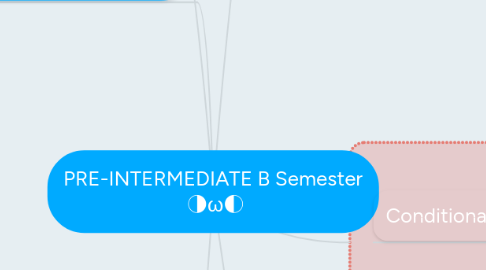
1. Countable and uncountable nouns
1.1. Countable nouns
1.1.1. Countable nouns are individual objects, people, places, etc. which can be counted.
1.1.2. Singular form
1.1.2.1. My dog is playing
1.1.3. Plural form
1.1.3.1. add "s"
1.1.3.1.1. My dogs are hungry.
1.2. Uncountable nouns
1.2.1. Uncountable nouns are substances, concepts etc that we cannot divide into separate elements. We cannot "count" them.
1.2.2. We usually treat uncountable nouns as singular : We use a singular verb
2. Future arrangements
2.1. Other ways of referring to the future
2.1.1. To be about to + infinitive
2.1.2. To be on the point of + -ing
2.1.2.1. Actions or events which we expect to happen in the immediate future
2.2. The future continuous (will +be-ing)
2.2.1. Events or actions that will be in progress at specific time in the future
2.2.2. Predicted orexpected trends
2.2.2.1. In the 21st century, people will be living to the age of 130.
2.3. The future perdfect simple (will+have+past participle)
2.3.1. Actions or events that will already be completed by a certain time in the furure
2.3.1.1. By the year 2008, I’ll have left school and started work.
2.4. Going to Future (be+going to+infinitive)
2.4.1. Intentions or olans
2.4.2. predictions based on present evidendce or knowleds
2.4.2.1. My sister’s going to have a baby.
2.5. Future simple (will + infinitive)
2.5.1. future facts
2.5.1.1. I’ll be 21 next month.
2.5.2. predictions or expectations
2.5.3. Instant decisions about the immediate future
2.6. Shall
2.6.1. Shall is sometimes used instead of will after I and we.
2.6.2. Shall must be used to start questions which are suggestions and offers.
3. Adjective (-ED/-ING)
3.1. -ING ----The Couse
3.1.1. Most sequels are disappointing
3.2. -ED ----The effect
3.2.1. He´s such a monotonunous speaker. I was so bored.
4. Modal verbs
4.1. Modal verbs are special verbs which behave very differently from normal verbs
4.1.1. Simple Modal Verbs
4.1.1.1. Can
4.1.1.1.1. to express general ability
4.1.1.1.2. to express possibility / impossibility
4.1.1.1.3. to ask a permission (informal).
4.1.1.1.4. I can fly
4.1.1.2. Must
4.1.1.2.1. to express certainty.
4.1.1.2.2. to make a strong recommendation.
4.1.1.2.3. to express necessity.
4.1.1.2.4. You must be tired now, you have worked all day long.
4.1.1.3. May
4.1.1.3.1. to make requests
4.1.1.3.2. to ask or to give a permission (formal)
4.1.1.3.3. to express possibility
4.1.1.3.4. May I make a phone call?
4.1.2. Past forms of Modal Verbs And Their Function
4.1.2.1. Might
4.1.2.1.1. to give or ask permission, or possibility in the past, because it is the past form of “May”
4.1.2.1.2. to express future or present possibility and probability
4.1.2.1.3. Interchangeably with “May” quite often with no difference in meaning.
4.1.2.1.4. It might rain tomorrow.
4.1.2.2. Should
4.1.2.2.1. to ask or give advice or recommendation.
4.1.2.2.2. often after these verbs: suggest, propose, recommend, insist, demand.
4.1.2.2.3. If you think that if person is likely to do something with less certainty or accidentally, you can use this structure: If + you + should+ verb or Should + you + verb
4.1.2.2.4. Don’t worry if I should be late tonight
4.1.2.3. Would
4.1.2.3.1. to express future in the past because it is the past form of “Will”
4.1.2.3.2. to express unreal action in the present
4.1.2.3.3. to ask someone to do something (formal), (structure: If + you + would+ verb)
4.1.2.3.4. I would be very frightened if someone pointed a gun at me.
4.1.2.4. Could
4.1.2.4.1. to express general ability in the past, because it is the past form of the “Can”
4.1.2.4.2. to express possible future actions similar to “May and Might” in meaning
4.1.2.4.3. to express unreal or impossible actions
4.1.2.4.4. to make a request or ask something
4.1.2.4.5. My grandfather could not swim
5. Agreements and Disagreements
5.1. Agreement (you like the idea)
5.1.1. that´s a good point
5.1.2. that´s absoluty true
5.1.3. that´s exactly what I think.
5.2. Disagreements (you dislike, not true)
5.2.1. It´s not true
5.2.2. i refuce it
5.2.3. I don´t believe.
6. Conditional type 1
6.1. If+ Simple present, subject +will +Verb
6.1.1. If i study hard, I will pass the exam.

